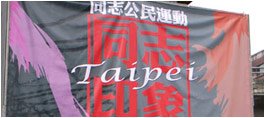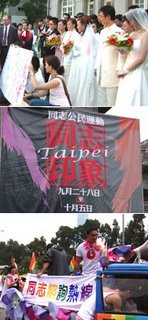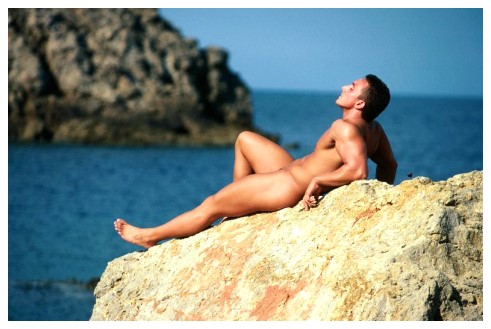 Taipei Pride’s annual parade drew up to 10,000 participants last Saturday. In the US, a new HIV/AIDS prevention campaign by the L.A. Gay and Lesbian Center creates controversy. Still on HIV, two studies have shown that practicing regular genital hygiene in males may reduce the risk of HIV infection.
Taipei Pride’s annual parade drew up to 10,000 participants last Saturday. In the US, a new HIV/AIDS prevention campaign by the L.A. Gay and Lesbian Center creates controversy. Still on HIV, two studies have shown that practicing regular genital hygiene in males may reduce the risk of HIV infection.Touted as Asia’s largest event of its kind, Taipei Pride’s annual parade drew up to 10,000 participants to walk the distance between Songshan Cigarette Factory and Huashan Culture Park last Saturday. After a string of forums, exhibitions, and workshops, the parade marked the culmination of Taipei Pride Festival which begun two weeks ago with a flag-raising ceremony in front of Taipei City Hall.
Under the theme “Go Together,” LGBT participants were urged to participate with friends and family. The crowd marched down Zhongxiao E. Road, one of the city’s main commercial arteries.
A giant rainbow flag held aloft by numerous volunteers led the procession, followed by cars sponsored by local clubs and organisations, of which many featured family-oriented themes. 2Her Publishing’s “Lesbian Kitchen,” for example, featured women pushing shopping carts to emphasise domestic bliss, while elsewhere the gay group “Water Boys” wore tan-baring speedos to subvert local stereotypes equating gays to anemic drug addicts.
The atmosphere was decidedly festive despite overcast skies, with much flag-waving and dancing as the crowd wound its way westwards.
“We are here to show that being gay is nothing to be ashamed of, and that we can and will show our faces!” said Sylvia Chen, one of the participants who joined the parade to support her friends.
Indeed, while allowed only a single lane of road, the procession drew the rapt attention of weekend shoppers and workers alike, most of who halted in their tracks to watch. Nor were the participants limited to local Taiwanese. To be found amongst the crowd were language students from the National Taiwan Normal University, English teachers from Canada, and activists from Japan, Singapore, and Hong Kong.
When asked what he thought of the parade, Kyle Belzer, a teacher from Detroit, Michigan, said that while the parade was expectedly much smaller than equivalents in cities such as New York or Chicago, he was surprised at the number of people participating. “This being still a pretty conservative country, I wasn’t expecting this many people,” he said, conceding too that the final numbers may be even higher than meets the eye given the length of the route. At this rate, he added with wry amusement, “the government might just have to close down the entire road next year.”

The parade, though the most visible and publicised event, was hardly the only to be held in conjunction with Taipei Pride that day. At Huashan Culture Park, organisers publicly wed four lesbian couples, a first in Asia for collective gay weddings. Holding the ceremony was a pastor from the Tong Kuang Light House Presbyterian Church, with Wang Ping, secretary-general of the Gender/Sexuality Rights Association, and JJ Lai, owner of the city’s iconic Gin Gin Bookstore, acting as emcees.
The four couples, wearing wedding dresses and tuxedos, exchanged vows as the thousand-strong crowd cheered on, a number of which held signs such as “Happily Married” or “Lesbians Unite.” Though gay marriages are still illegal in Taiwan, the ceremony was held in full accordance to the rituals of a Christian wedding, complete with witnesses and a tossing of the bridal bouquets.
After the wedding, the main actors of upcoming gay film Eternal Summer made an appearance, followed by a drag rendition of Chicago as performed by local artists Da-Bing and Xiao-Bing.
Elsewhere in the park, the city government’s Department of Civil Affairs continued its “Gay Impressions” art exhibition, of which highlights included prints by Hong Kong artist Lily Lau and Jiang Jing-Fang’s photo documentary of drag queens. The park’s “Art Boulevard,” on the other hand, played host to the Rainbow Market, a bazaar with stalls selling everything from gay literature to handicrafts.
Despite original plans to have the day end with a music festival, organisers had to cancel at the last minute citing poor ticket sales and financial reasons. Originally intended to provide an incentive to stay post-wedding and performances, the music festival was to have featured local DJ’s and separate floors for gays and lesbians. Judging by the number of people thronging the market stalls way past its stated closing – the organisers need not have worried. – Philip Hwang, Taipei.

No comments:
Post a Comment